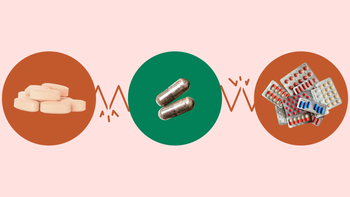
Nitric Oxide Supplements: Can They Boost Your Heart Health, Workouts, and More?
Key takeaways:
Nitric oxide supplements contain the building blocks for nitric oxide, which can help your body make more of it. But they don’t actually contain nitric oxide.
The main reason people take nitric oxide supplements is to improve athletic performance. But some also take them to address heart health or erectile dysfunction issues.
The research on the benefits of nitric oxide supplements is mixed. By trying them in the recommended amounts, you’ll most likely be able to tell if they’re working.
Table of contents

There’s growing interest in nitric oxide supplements and their benefits — especially among athletes. But understanding how they work can be a little confusing. This is largely because nitric oxide supplements don’t actually contain nitric oxide. Instead, they are made of ingredients that help your body make more nitric oxide.
If you’re considering trying these supplements, or if they’re already a part of your health regimen, here’s what you need to know.
What is nitric oxide, and what does it do in the body?
Nitric oxide is a gas created when the amino acid arginine combines with the chemical nitrate. Nitric oxide plays many important roles in many different body systems, including the:
Cardiovascular system
Nervous system
Immune system
Lungs
Gastrointestinal system
Search and compare options
Among the many functions of nitric oxide in the body, it acts as a vasodilator. In other words, it relaxes blood vessels, allowing blood to flow more easily and helping to relax muscles.
Keep in mind that nitric oxide is not the same as nitrous oxide (“laughing gas”). Although they look and sound similar, nitrous oxide is what healthcare teams sometimes use for anesthesia. Nor is it the nitrous oxide — “whippets” — that some people misuse to get a quick “high.”
Benefits of nitric oxide supplements
Improved blood flow from nitric oxide supplements may have a range of positive effects, including:
Lowering blood pressure, allowing the heart to not have to work as hard
Allowing blood to deliver oxygen to muscles quicker, which can boost athletic performance
Helping blood flow more easily and readily to the genitals, allowing for better erectile function
What do top nitric oxide supplements contain?
Several different ingredients show up in nitric oxide supplements in various combinations, including:
Arginine: Arginine is a building block for nitric oxide, so it’s a common ingredient in supplements. But even if more arginine is available, other factors play a role in nitric oxide production. So more arginine doesn’t necessarily lead to more nitric oxide.
Citrulline: This amino acid is a supplement ingredient because it gets converted into nitric acid in the blood vessels.
Nitrates: These natural chemicals can be found in beetroot extract or other nitrate-containing foods. They are included in supplements because the body can turn nitrates into nitric oxide. They are thought to boost muscle power.
Antioxidants: Vitamin C, flavonoids, and other polyphenols (chemicals found in plants) are included because they might make nitric oxide more available in the body. But more real-life application studies are needed.
What are some side effects and risks of nitric oxide supplements?
Every nitric oxide supplement is different, but they tend to share some common ingredients (like those listed above). And these ingredients tend to cause similar side effects, which are usually mild:
More than 9 g of arginine per day may cause diarrhea or nausea.
More than 9 g of citrulline per day (or 6 g per day for 16 days) may cause gut discomfort.
Antioxidants in large amounts — for example, more than 2,000 mg of vitamin C — may cause stomach pain, diarrhea, or nausea.
Creatine and athletic performance: Creatine is an amino acid stored in your muscles. A fitness coach shares how daily creatine supplements boost his strength.
Foods for muscle growth? What you eat helps support muscle growth and recovery after exercise. Check out the top muscle-building foods.
Heart-healthy exercises: From strength training to brisk walking, a physical therapist shares exercises to improve heart health.
In recommended amounts, beetroot has no known side effects or risks.
Are nitric oxide supplements effective?
Scientists have studied nitric oxide supplements for different uses, and the research has shown various results. In general, two things seem to improve how the supplement works.
First, the inclusion of citrulline (or a combination of citrulline and arginine) seems to work better than supplements containing arginine alone. A 2022 review found that taking 2.4 g to 6 g of citrulline a day for around 1 to 2 weeks helped participants make more nitric oxide and, in turn, improve exercise performance. Supplements that combined citrulline and arginine also enhanced physical activity, but more research on specific doses of each amino acid is needed.
Read more like this
Explore these related articles, suggested for readers like you.
Secondly, combining citrulline with nitrates may also be more effective for exercise performance than either component on its own. According to a 2022 study, people who took 3 g of citrulline and 2.1 g of beetroot extract a day for about 2 months had the biggest boost in endurance.
Nitric oxide supplements for athletes
The research into the benefits of nitric oxide supplements for athletes is also mixed. One review showed nitric oxide supplementation to be associated with improved performance in untrained or moderately fit athletes. But there were no effects on highly trained athletes.
One reason for this might be that physical activity itself has been shown to boost nitric oxide. So perhaps the trained athletes already had plenty of it in their system.
Nitric oxide supplements for heart health
For those looking to improve heart health, research has shown that citrulline, as well as a combination of citrulline and arginine, potentially helps to lower blood pressure and improve heart function.
But, keep in mind, nitric oxide supplements are not a recommended or standard treatment for heart health. Talk with your healthcare team before taking nitric oxide supplements for heart health.
Nitric oxide supplements for erectile dysfunction
Research is limited regarding nitric oxide supplements and erectile dysfunction. Although, there’s at least one small study that has shown citrulline to be helpful for mild to moderate cases.
Which foods contain nitric oxide?
Like with the supplements, research regarding the use of whole foods to boost nitric oxide for sports performance is mixed. That said, foods that might help increase nitric oxide production are generally part of a nutritious diet. These include:
Leafy greens, including spinach, kale, and chard
Carrots
Beetroot
Seafood
Nuts
Seeds
Soy
Watermelon
Tea and coffee
Who should take nitric oxide supplements?
Overall, the following groups of people may benefit from nitric oxide supplementation:
Athletes who want to improve sports performance
People looking to support heart health
People with erectile dysfunction
Remember, it’s always a good idea to talk with a healthcare professional if you’re considering taking nitric oxide supplements. They can help you decide whether the supplements are safe for you and give you recommendations for taking them.
Who should avoid nitric oxide supplements?
Given its effect on blood flow, talk with your healthcare team before taking nitric oxide supplements if you:
Have a liver problem
Have low blood pressure or other heart problems
Take medication for diabetes or heart health
Have had a heart attack in the past
Have kidney disease
Have a viral infection
The bottom line
While the research on nitric oxide supplements is mixed, there’s some compelling science out there. When it comes to athletic and sexual performance, you’ll likely be able to tell if they’re beneficial for you. So, given that they tend to be relatively inexpensive and are generally thought to be safe, you might consider giving these supplements a try with your healthcare team’s approval.
Why trust our experts?



References
Abeyakirthi, S., et al. (2020). Nitric oxide. DermNet.
Allerton, T. D., et al. (2018). L-citrulline supplementation: Impact on cardiometabolic health. Nutrients.
Bescós, R., et al. (2012). The effect of nitric-oxide-related supplements on human performance. Sports Medicine.
Burgos, J., et al. (2022). Combined effects of citrulline plus nitrate-rich beetroot extract co-supplementation on maximal and endurance-strength and aerobic power in trained male triathletes: A randomized double-blind, placebo-controlled trial. Nutrients.
Corbin, J. D. (2004). Mechanisms of action of PDE5 inhibition in erectile dysfunction. International Journal of Impotence Research.
Cormio, L., et al. (2011). Oral L-citrulline supplementation improves erection hardness in men with mild erectile dysfunction. Urology.
D’Unienville, N. M. A., et al. (2021). Effect of food sources of nitrate, polyphenols, L-arginine and L-citrulline on endurance exercise performance: A systematic review and meta-analysis of randomised controlled trials. Journal of the International Society of Sports Nutrition.
Jones, A. M., et al. (2018). Dietary nitrate and physical performance. Annual Review of Nutrition.
Kiani, A. K., et al. (2022). Dietary supplements for improving nitric-oxide synthesis. Journal of Preventive Medicine and Hygiene.
Kumar, S., et al. (2017). Therapeutic role of nitric oxide as emerging molecule. Biomedicine and Pharmacotherapy.
Luiking, Y. C., et al. (2012). Arginine de novo and nitric oxide production in disease states. American Journal of Physiology, Endocrinology and Metabolism.
Najjar, R. S., et al. (2022). Blueberry polyphenols increase nitric oxide and attenuate angiotensin II-induced oxidative stress and inflammatory signaling in human aortic endothelial cells. Antioxidants.
National Institutes of Health. (2024). Dietary supplements for exercise and athletic performance. U.S. Department of Health and Human Services.
Nyawose, S., et al. (2022). The effects of consuming amino acids L-arginine, L-citrulline (and their combination) as a beverage or powder, on athletic and physical performance: A systematic review. Beverages.
Oral, O. (2021). Nitric oxide and its role in exercise physiology. The Journal of Sports Medicine and Physical Fitness.
Schulman, S. P., et al. (2006). L-arginine therapy in acute myocardial infarction: The vascular interaction with age in myocardial infarction (VINTAGE MI) randomized clinical trial. Journal of the American Medical Association.





























